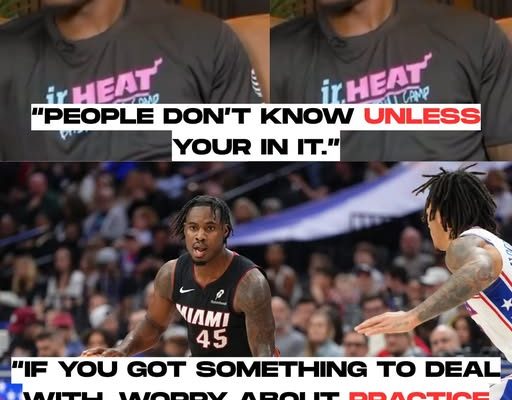When Davion Mitchell stepped into the sweltering practice facility in Miami for the first time as a member of the Heat, it didn’t take long for him to realize he wasn’t in Sacramento anymore. The difference wasn’t just in the humidity, or the palm trees outside the windows, or the change in scenery. It was in the silence that filled the gym before sunrise, the thud of the ball echoing off the walls as a teammate worked alone, drenched in sweat, long before the coaches arrived. It was in the ghostly early-morning routines that seemed to whisper one message over and over again: no days off.
For Mitchell, who was drafted by the Sacramento Kings with the ninth overall pick in 2021, his journey to the Miami Heat is a tale of resilience and opportunity. In Sacramento, Mitchell built his reputation as a tenacious on-ball defender, a player unafraid to pick up opposing guards full court, and a competitor who never backed down. Yet his offensive development stalled, and as the Kings blossomed behind De’Aaron Fox and Domantas Sabonis, Mitchell’s role began to shrink. Miami saw something different—something they could mold, sharpen, and unlock. To Pat Riley and Erik Spoelstra, Mitchell was more than a defensive specialist. He was Heat material.
What makes Heat culture so legendary in the NBA isn’t just the stories—it’s the expectation that every player, from the franchise star to the last man on the bench, must pour themselves into the work. And for Mitchell, the fit was instantaneous. “There’s no hiding here,” he said after his third week with the team. “If you don’t bring it every day, they’ll know. If you don’t take care of your body, if you cheat the weight room, if you skip steps—you won’t last here. That’s what I love. This place forces you to be your best.”
Mitchell’s work ethic has never been in question. It’s been the driving force of his basketball life since his high school days in Georgia. At Baylor, he helped lead the Bears to a national championship in 2021, earning the nickname “Off Night” because players matched up against him often had one. In Miami, that defensive tenacity is not just welcome—it’s worshipped. But what Heat coaches and player development staff quickly recognized was that Mitchell wanted more. He wasn’t content to be a defensive ace. He wanted to be a complete player, and he was willing to pay the price.
So began the transformation. Miami is one of the few franchises in the league that leans fully into offseason conditioning and culture indoctrination. Newcomers are immediately put through the famed body-fat testing process. Players are required to hit conditioning thresholds, and many have shown up out of shape only to be sent packing. Mitchell, to no one’s surprise, crushed every test. “That kid came in like a Marine,” said a Heat assistant coach. “He was ready for pain, ready for discomfort, ready for the hard parts. And you could tell, he wanted to be here.”
The offseason training program started with 5:00 a.m. wake-up calls, early shooting sessions, and extensive defensive drill work that simulated real game fatigue. Mitchell’s body was pushed to its limits, and so was his mind. In Miami, mental toughness is just as vital as physical fitness. Mitchell embraced the grueling film sessions, breakdowns with Spoelstra where a single defensive misstep could be dissected for ten minutes, and the competitive scrimmages that often turned into battles more intense than actual games.
His improvement wasn’t slow. It was explosive. His footwork tightened, his handle improved, and his mid-range jumper became a weapon. Miami encouraged him to attack more in transition, to explore the pick-and-roll game, and to use his strength as a finisher. What impressed Spoelstra most, however, was his humility. “He asks questions constantly,” Spoelstra said. “He’s not afraid to admit what he doesn’t know. But he absorbs everything and applies it. And that’s rare.”



